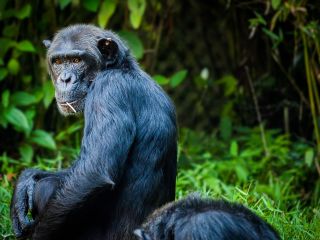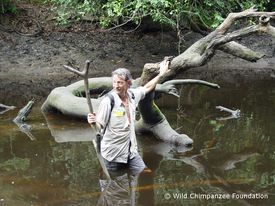Animal Behavior
The Legacy of Two Great Primatologists
Goodbye to Frans de Waal and Christophe Boesch.
Posted March 19, 2024 Reviewed by Abigail Fagan
Key points
- Christophe Boesch and Frans de Waal, who both passed away this year, were influential primatologists.
- De Waal’s merits were in raising groundbreaking questions about the difference between humans and animals.
- Boesch studied ecology and behavior of wild chimpanzees, in particular their tool making and hunting behavior.

The year 2024 is not yet old, but we have already lost two great primatologists: Christophe Boesch and Frans de Waal. Both were controversial and extremely influential in their field of research, and both died in their early 70s. Both also understood that it is not only important to investigate our close relatives, but also to save them.
Frans de Waal was born in 1948 in the Netherlands and was the director at the famous Yerkes National Primate Research Center at Emory University in Atlanta. His books were well-known all over the world. He made bonobos, “The Forgotten Ape,” famous to a huge audience, and he dared to address such topics in his books as gender, morality, and empathy in animals. He talked about “chimpanzee politics” and reconciliation before anyone else did. His long-term observations of the world's largest captive colony of chimpanzees at the Arnhem Zoo resulted in his book, Chimpanzee Politics, in 1982. This book offered the first scientific description of primate behavior explicitly in terms of planned social strategies. It made a lasting impression on me and was one of the reasons I became a comparative psychologist.
De Waal’s merits were not so much in the conduction of great experiments, but in raising new and groundbreaking questions. He was the first to ask whether primates have a sense of fairness. Although his methods were sometimes surprisingly flawed – including his most famous Nature paper “Monkeys Reject Unequal Pay” (Brosnan & de Waal 2003) – his greatest achievement was starting discussions about these questions. And these discussions about what makes us human are ongoing. Or as de Waal himself summarized his career: “I’ve brought apes a little closer to humans but I’ve also brought humans down a bit.”

Christophe Boesch on the other hand, was probably less interested in the comparison of apes with humans, but more into his subjects: the chimpanzees of the Tai Forest in the Ivory Coast. He was born in 1951 in Switzerland and was the director of the famous Max Planck Institute of Evolutionary Anthropology in Leipzig, Germany. For his master thesis, he worked with the mountain gorillas of Virunga National Park in Rwanda, under the supervision of the legendary primatologist Dian Fossey.
Boesch spent a major part of his life in Africa's forests studying the behavior of wild chimpanzees. In 1976, he began his work with chimpanzees at Taï National Park in Ivory Coast. There he studied ecology, social organization, tool use, hunting, cooperation, food-sharing, and also cognitive capacities. He was called “the chimpanzee man,” with groundbreaking papers about the tool-making and hunting behavior of our closest living relatives (Boesch & Boesch 1989, 1990). For example, he described in detail how wild chimpanzees hunt colobo monkeys, with each of them having a role in that action – one was for example the chaser, and another the ambusher. It is certainly not too much to say that he loved his chimpanzees, and he was not amused when comparative psychologists such as Michael Tomasello called into question what these apes are capable of. This passion led him to work intensively to protect chimpanzees, making great contributions to their preservation in the wild. He not only founded the Wild Chimpanzee Foundation, which runs programs in Ivory Coast, Guinea, Sierra Leone and Liberia, but he also made the lives of chimpanzees, and the threats they face, visible to a wide public. His most famous approach in that direction is maybe the Disneynature movie Chimpanzee. Or, as he once put it in the German newspaper Die ZEIT, “If I ally myself with the devil Disney, then we could find a new way to support the chimpanzees.”
Although these great primatologists were controversial, and sometimes took unusual paths, the saying of the French philosopher Gaston Bachelard rings true for them both: “The characteristic of scientific progress is our knowing that we did not know.”
We will miss them both very much!
References
Boesch, C., & Boesch, H. (1989). Hunting behavior of wild chimpanzees in the Tai National Park. American journal of physical anthropology, 78(4), 547-573.
Boesch, C., & Boesch, H. (1990). Tool use and tool making in wild chimpanzees. Folia primatologica, 54(1-2), 86-99.
Brosnan, S., de Waal, F. (2003) Monkeys reject unequal pay. Nature 425, 297–299


